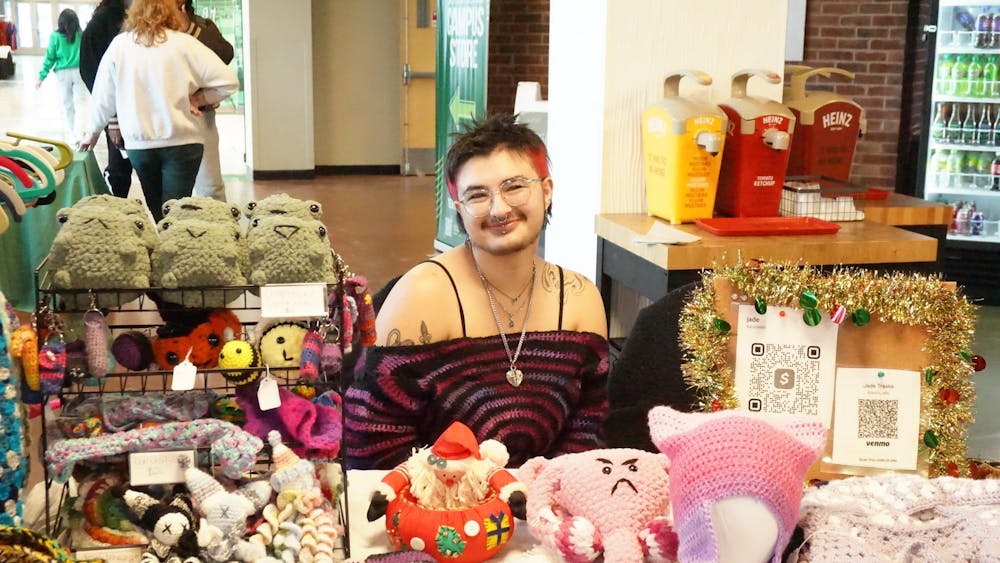Veronica Konglim, EMU alum, remembers when she arrived in Detroit, Michigan on May 13, 2013. Her eyes swollen from crying during her flight from Cameroon, Africa -- leaving her 18-month old son behind. That was the last time she physically touched him. The pain of leaving her son to pursue higher education made her wonder if it is all worth it.
“I wanted something more, I wanted to understand the policies around education and how those policies impact learning,” she said. “A better way to understand how these areas interconnect was to get a degree or to further in my education.”
Her story is one of many when it comes to the hardships of black students pursuing higher education. According to the National Center of Education Statistics, about 13 thousand black graduate students received their doctorate during the years 2014-2015.
Ph.D. is the only option
The Black Graduate Student Association (NBGSA) held “The Doctor is In,” a discussion panel, Thursday, March 21, in Eastern Michigan University’s Halle Library to provide an insight on the doctoral pursuit as people-of-color.
NBGSA is the nation's largest interdisciplinary graduate organization for black students. It’s a non-profit, student-ran organization for African-American students, to ensure their academic success in their higher education and careers since 1989.
Dar Mayweather, an entrepreneur and EMU graduate and Elena Simpkins, a University of Michigan graduate answered questions regarding their chosen doctoral program and biggest challenges.
Mayweather said he originally wasn’t going to pursue a master’s degree, but is now pursuing a Ph.D. in Educational Leadership and Education. He feels that an important aspect missing from teaching leadership is race.
Along with the many responsibilities as a Ph.D. student, one of Simpkins’ biggest challenges is her battle with depression.
“Mental health as a Ph.D. student, especially at a university like U of M where being burned out is almost a requirement is really hard,” she said. “Being able to get out of my own head was probably the biggest challenge of being viewed as not enough.”
In 2014, University of California, Berkley released the “Graduate Student Happiness & Well-Being Report.” It stated that about 47 percent of Ph.D. and 37 percent of master’s studentswere depressed.
We must walk in excellence
Dr. Heather Neff, an EMU professor of 25 years told the audience about her challenges when she attended the University of Michigan in the 1970s. During that time, there were few black students in UM, let alone in higher education.
“It was a very alienating experience,” she said. “I would sit in classes in the University of Michigan and have people behind me yell ‘shut up bitch’ when I answered a question.”
U of M graduate, Dr. Lumas Helaire, said that his experience in the classroom as a black male is challenging and emphasized the importance of teaching in the classroom for students-or-color.
“The thing that was challenging about being black in the classroom is that we weren’t talking about being black,” he said. “But we’re talking about teaching students who are black and brown.”
Hopes for the future
Event organizer and NBGSA archivist, Felicia Jefferson said she felt this panel discussion was necessary because she wanted students to hear a wider range of stories from people who have or are currently pursuing their Ph.D.
Founder and President of NBGSA, Alexandra Smith said that she hopes the students debating on pursuing the doctoral process take that step and believe that they can do it.
“Many times we are often told that ‘you are not going to be able to do that,’ but we have people here saying ‘I did, so can you,’ is really important, especially in the black community,” she said. “I hope people walked away knowing that you maybe iffy right now but you can do it.”
EMU graduate, Ja’La Wourman will be starting her Ph.D. program at Michigan State in the fall. She thought it would be helpful to hear about the processes current doctoral students are going through to get that confirmation that she can do it.
“I’m finishing up my master’s and I got accepted into a Ph.D. program, but there is that inner self doubt sometimes,” she said. “I want to make sure I’m prepared when I start my Ph.D.”










